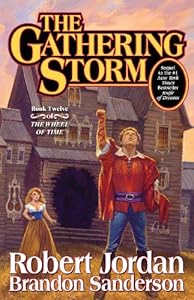 Cover via Amazon
Cover via AmazonThe Gathering Storm is a mighty tome of a book (I calculate it at around 325,000 words, which is big, even by normal fantasy standards) and took me a while to read. One of the times I wished a book had been available for Kindle, as the weight would have been easier on my aching arms.
I must preface this review by confessing that I have not read all the previous 11 books in The Wheel of Time series; in fact, I’ve read only a couple. So, some of the terms, names and affiliations were confusing to begin with, but I soon knew where I was and where the story was going, so to speak. It is a work on an epic scale and was, of course, actually written by Brandon Sanderson, working from copious notes and incomplete work from the original author.
The story is an intricate weave of many threads, which form a whole that is completely satisfying. The language is clear, evocative and appropriate throughout, with no slips into anachronism. Characters, although fully drawn in previous volumes, appear as real on these pages as though they have been created for this book. The settings are fully described, allowing the reader an experience that involves rather than on that simply tells of detail.
The element of magic is restricted, making the tale reliant as much on the humanity of the characters as on their ability to weave spells and use their special gifts and properties. This is, for me, essential in epic fantasy. The overuse of magic reduces the empathy a reader may otherwise feel for the characters and this aspect has been avoided here.
I will not make any attempt to convey the storyline here. There are over 750 pages of text and very few wasted words. Any attempt to précis the plot must inevitably do the work an injustice. As usual, my review is concerned with the quality of the writing and the depth of the story told.
Just occasionally I wondered at the number of names I came across: on one page, I noted twenty new names of characters and/or places.
But this is a very satisfying tale. Clearly, readers will benefit from their greater background knowledge of characters and events if they have read the whole series, but the lack of such experience results in only a small amount of confusion, which is quickly resolved as events unfold in the context of the story.
Anyone who has read and enjoyed Richard Adam’s Maia or The Lord of the Rings, amongst others, will enjoy this book. I happily recommend it and look forward to the final two volumes, still under construction as I write this.

No comments:
Post a Comment